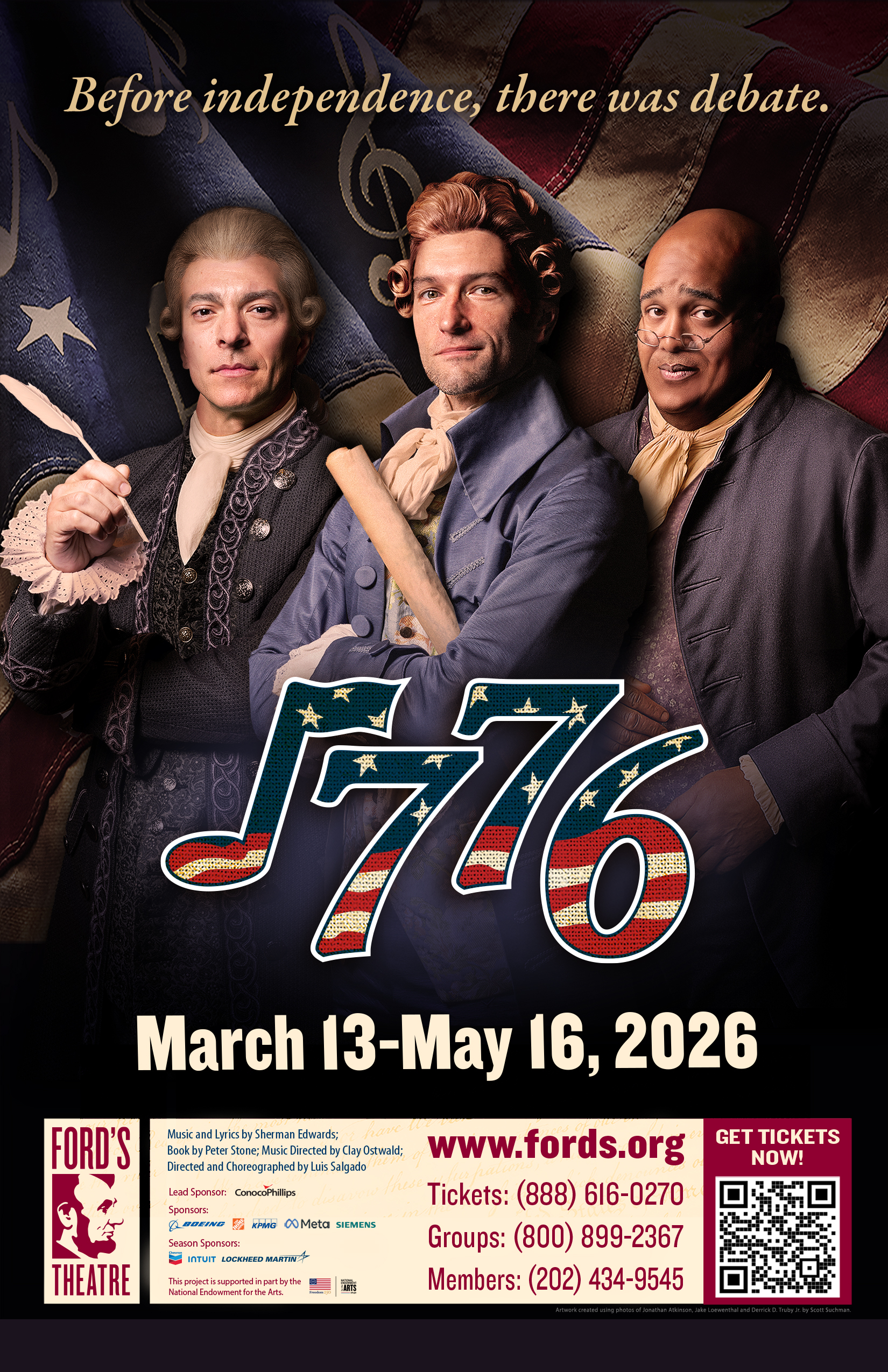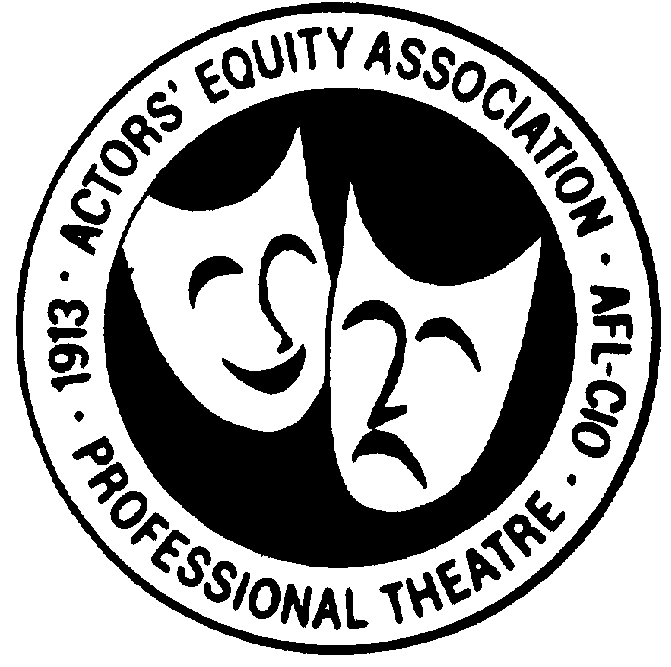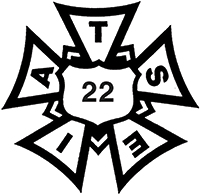A First Look – 2026
January 16-17, 2026
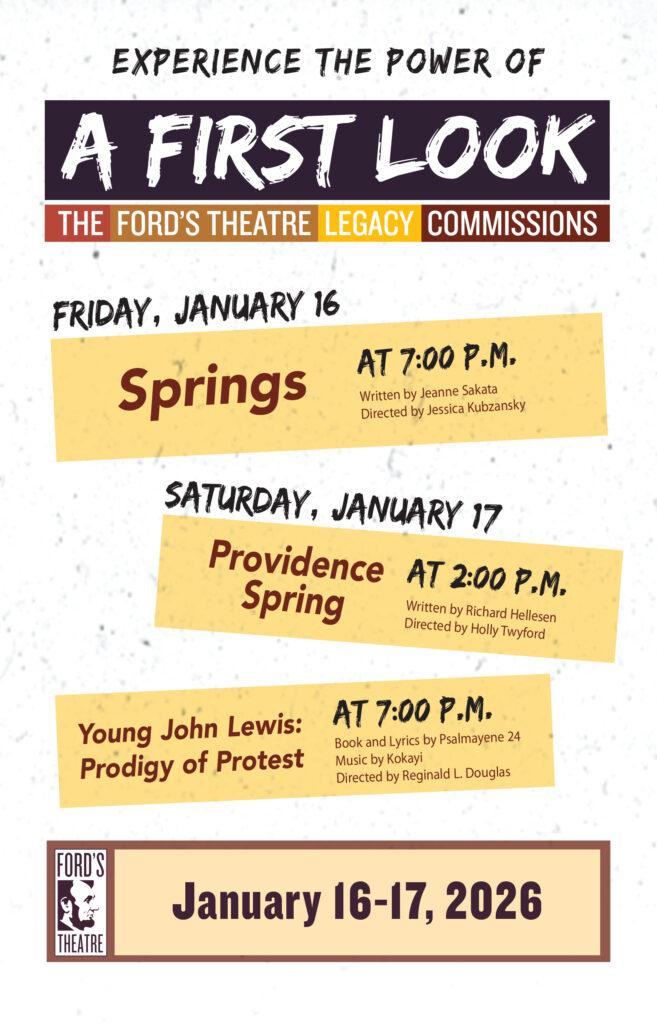
Welcome
Welcome to A First Look at Ford’s Theatre, a festival of new work called “a must-attend event on the D.C. theater scene,” and lauded by theatre critics as the launching pad for The American Five by local playwright Chess Jakobs.
Through A First Look, Ford’s Theatre showcases plays at various stages of development and engages audiences who are passionate about historic drama and supporting the creation of new plays. The work in the festival includes plays from the Ford’s Theatre Legacy Commission initiative, which seeks to celebrate stories that have often been neglected or left out of history books and the theatrical canon.
This year, A First Look presents the commissioned work Springs by Jeanne Sakata. At the heart of this epic story, Sakata explores what it means to belong while keeping faith in a country that has not always kept faith with you. In addition, the festival features new works that explore historically significant events and figures that have contributed to the fabric of America. The spark for Richard Hellesen’s Providence Spring began when he read a sign on 7th Street that read: “Missing Soldiers Office, 3rd Story, Room 9—Miss Clara Barton.” The festival concludes with Young John Lewis: A Prodigy of Protest by Psalmayene 24, music by Kokayi. This contemporary and rousing musical reveals the bravery of a mighty historic figure. The musical is part of Mosaic Theatre Company’s 2025-26 season.
Stay tuned for Madeline Sayet’s The Knife–an upcoming commission exploring the story of Mohegan leader Samson Occom, and the new cohort of Legacy Commissions for 2027.
And I hope you join us in the spring as Ford’s celebrates the Semiquincentennial of our country with the classic American musical 1776.
Thank you for supporting the development of new historical plays and for being an integral part of A First Look.


Paul R. Tetreault
Director
Ford’s Theatre
Download the Program
Connect with Ford’s Theatre
Ford’s Theatre Rules of Engagement
We are glad that you are joining us at Ford’s Theatre today. This is a welcoming and interactive community. Whether you are here to visit our historic site or to see a show, we invite you to be your authentic self.
At Ford’s Theatre:
- We are allowed to be human, in all the ways that make us unique.
- We are allowed to be human together. We encourage you to find moments of respectful connection and engagement with other members of the community.
- We are on common ground. We are all here to enjoy a shared experience and though our reactions and responses may vary, we will remain respectful.
- We are creating a live theatrical experience together; audible reactions and responses are welcome. The actors need you to engage with what you see but not to distract them from their performances.
- We also welcome the use of personal communication devices if they help you to better experience the show, but we encourage you to respect the actors’ work and the other audience members around you. Please note that the taking of photographs, video or sound recordings of the performance is not permitted.
Let’s create something beautiful together.
Ford’s Theatre Underwriters
Lead Sponsor


At Boeing, we embrace the opportunity to be a positive catalyst for change in the places we call home. Each year, through Boeing Global Engagement, we invest in the next generation of innovators and explorers, veterans and their families transitioning after service, and local programs that uplift communities. Our commitment to building stronger communities is deeply rooted in the passion and dedication of our employees, who give their time, talent and resources. Our journey is powered by purpose, inspired by innovation, and driven by a steadfast dedication to strengthen and enrich our communities and create lasting impact for generations to come.
Season Sponsor


Chevron is a proud sponsor of Ford’s Theatre. As one of the world’s leading integrated energy companies, Chevron’s success is driven by our people and their commitment to delivering industry-leading results and superior stockholder value in any business environment. We do this by operating responsibly, applying advanced technologies, capturing new high-return opportunities, and executing with excellence in a socially and environmentally responsible manner. More information about Chevron is available at www.chevron.com.

Michael K. Wirth
Chairman and Chief Executive Officer
Season Sponsor


At Intuit, we are driven by our mission of powering prosperity around the world and believe everyone deserves the opportunity to prosper. This includes investing in our communities and supporting programs, such as today’s performance that help bring people together, spark creativity, and promote collaboration. We are proud to support Ford’s Theatre as a season sponsor.

Kerry McLean
Executive Vice President, General Counsel and Corporate Secretary
Season Sponsor


At Lockheed Martin, we lead in aerospace and defense technology—pushing innovation and scientific discovery to deliver solutions that keep the U.S. and its allies safe. Whether through transformative technologies or meaningful community partnerships, like the one we have had with Ford’s Theatre for many years, we are committed to making a difference in our communities and to supporting our important national institutions.

James D. Taiclet
Chairman, President and Chief Executive Officer
The Plays
Springs
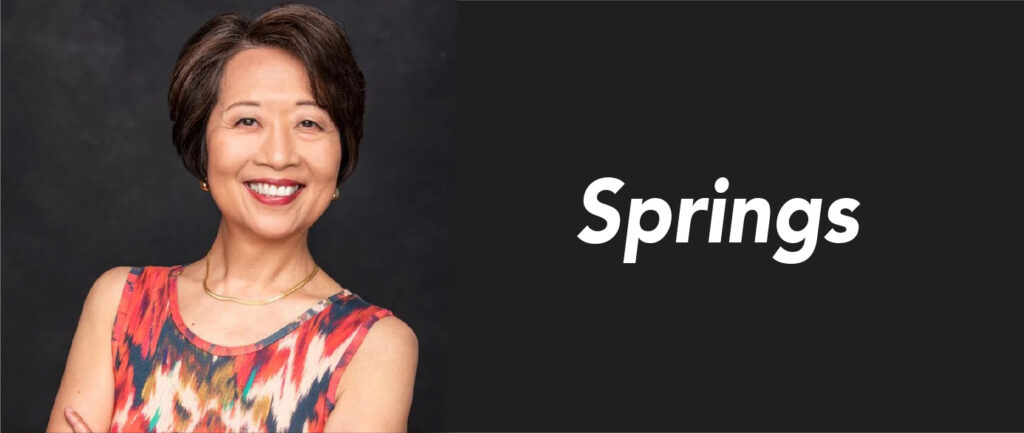
Jeanne Sakata is an award-winning actor and playwright whose versatility spans across theatre, television, film and voiceover. Onstage, Jeanne most recently performed in Anna Deavere Smith’s Twilight: Los Angeles, 1992 at Center Theatre Group’s Mark Taper Forum, the world premiere of Moisés Kaufman and Amanda Gronich’s Here There Are Blueberries at La Jolla Playhouse, and Carla Ching’s world premiere of Revenge Porn at Ammunition Theatre Company. Jeanne’s play Hold These Truths, inspired by the life of civil rights giant Gordon Hirabayashi and originally commissioned by Center Theatre Group, had its world premiere in 2007 with Los Angeles’ East West Players. It has since had over two dozen productions across the country with extended runs at Barrington Stage, Arena Stage, and TheatreWorks Silicon Valley. Hold These Truths is on display at the Library of Congress Playwrights Archive in the Asian American Pacific Islander Collection in Washington D.C., where the Jeanne Sakata Collection was established in July 2011. Jeanne authored the 2021 L.A. Theatre Works audio play For Us All, commissioned and produced by LA Theatre Works, inspired by the 1980’s “coram nobis” court battle of Fred Korematsu. Among numerous honors, Jeanne has received the Los Angeles Ovation Award for Outstanding Lead Actress in Chay Yew’s Red at East West Players, a Trailblazer Award for Outstanding Artistic Achievement & Raising the Visibility of the API Community by East West Players and a Lee Melville Award for Outstanding Contribution to the Los Angeles Theatre Community by Playwrights’ Arena. Currently working on an audio play adaptation of Frances Hodgson Burnett’s The Secret Garden for LA Theatre Works, she is honored and delighted to participate in the Ford’s Theatre 2023 Legacy Commissions Initiative.
Set against the shifting landscapes of the early twentieth century, this play follows Kyusaburo “Harry” Sanada, a young man who leaves Japan in search of a place to build a life shaped by purpose and possibility. From the farms of the West Coast to the fields of an internment camp during WWII, Harry’s knowledge of the land becomes both his livelihood and his lifeline, sustaining his family and the community around him. As he confronts exclusion laws, suspicion and the violence of forced incarceration, Harry holds fast to his belief in what America could be. When he later turns his attention to the Gilroy Hot Springs, he imagines a sanctuary where people might find peace in nature—and in one another. At its heart, this play asks what it means to belong while keeping faith in a country that has not always kept faith with you.
Credits
Written By
Jeanne Sakata
Directed By
Jessica Kubzansky
Dramaturg
Sydné Mahone
Stage Directions
Ayanna Hardy
Stage Manager
Julia Singer
Production Assistant
Maddie Baylor
Cast
Harry Kyusaburo Sanada
James Yaegashi
Ensemble
Dylan Arredondo
Tomiko/Ensemble
Sumié Yotsukura
Masuo Kizaki/Ensemble
Eymard Cabling
Time: Now and before.
Setting: Many.
Providence Spring

Richard Hellesen is the author of over forty produced plays and musicals for adults and young audiences. He is proud to be an Associate Artist at Ford’s Theatre, where his work includes Necessary Sacrifices, Freedom’s Song (co-bookwriter), One Destiny, The Road From Appomattox and Investigation: Detective McDevitt. Additionally, he has written the scripts for the 2015 Lincoln Commemoration Now He Belongs to the Ages and four Annual Galas. His most recent play, the solo show Eisenhower: This Piece of Ground, starring Tony-winner John Rubinstein, premiered off-Broadway at Theatre at St. Clement’s in 2023 and continues to be produced across the country, including regionally at Olney Theatre Center and the Majestic Theatre in Gettysburg. Nationally, his work has been seen at such theatres as South Coast Repertory, the Denver Center Theatre Company, Los Angeles Repertory Company, Barrington Stage, North Coast Repertory, Florida Stage, Geva, Syracuse Stage, Stage West, Gretna Theatre, Sundance Children’s Theatre, Imagination Stage, People’s Light & Theatre and City Theatre in Miami. Richard has received writing awards from the National Theatre Conference, Philadelphia Festival Theatre for New Plays, Beverly Hills Theatre Guild, and PEN USA-West. His two dozen short plays include five finalists for the National Award for Short Playwriting. Twice he was playwright-in-residence at the William Inge Center for the Arts in Kansas. He’s a member of the Dramatists Guild and the National Theatre Conferenc. He’s also an avid dramaturg, serving as Production Dramaturg for the 2024 Ford’s production of Mister Lincoln, starring Scott Bakula, and helping develop new plays annually at the B Street Theatre New Comedies Festival in Sacramento, where he makes his home.
Set in the years following the Civil War, Providence Spring traces Clara Barton’s little-known mission to uncover the fate of thousands of missing Union soldiers. What begins in a modest office on Seventh Street becomes a sweeping journey through bureaucratic resistance, personal animosity and the unexpected allies who help shape her purpose. As Barton brings answers to grieving families, she confronts the reality that while the war has ended, the nation’s struggle to fulfill its promise of “a new birth of freedom” is only beginning. Grounded in the power of memory—personal and historical—the play explores why preserving truth matters in a country so often asked to forget.
Credits
Written by
Richard Hellesen
Director
Holly Twyford
Dramaturg
José Carrasquillo
Stage Directions
Ayanna Hardy
Stage Manager
Stefania Giron Zuluaga
Production Assistant
Jazzy Davis
Cast
Clara Barton
Erin Weaver
Libbie/Mrs. Hill
Justine “Icy” Moral
Dorence Atwater
Chris Stinson
Captain James Moore
Max Johnson
Colonel Sewell/Edwin Stanton/William Griffin/Horace Greeley
Todd Scofield
Arnold Cato
John Floyd
Delia
Debora Crabbe
Time: May 1865 – February 1866; and additionally, Fall, 1868.
Setting: Washington, D.C.; Annapolis, Maryland; Andersonville, Georgia; and New York City.
Young John Lewis: Prodigy of Protest

Psalmayene 24 is an award-winning playwright, director and actor. He is currently the Andrew W. Mellon Foundation Playwright in Residence at Mosaic Theater Company. Playwriting credits include: Monumental Travesties, Dear Mapel (Charles MacArthur Award Nomination for Outstanding Original New Play or Musical) and Les Deux Noirs (Charles MacArthur Award Nomination for Outstanding Original New Play or Musical, and Venturous Capital Grant recipient) at Mosaic Theater. Out of the Vineyard at Joe’s Movement Emporium; The Blackest Battle at Theater Alliance; The Frederick Douglass Project (co-written with Irish playwright Deirdre Kinahan) at Solas Nua; and Cinderella: The Remix at Imagination Stage. His one-person play, Free Jujube Brown!, is recognized as a seminal work in Hip-Hop Theatre and is published in the anthology, Plays from the Boom-Box Galaxy: Theater from the Hip-Hop Generation (TCG). Directing credits include: Metamorphoses (Helen Hayes Award, Outstanding Direction of a Play) at Folger Theatre; Tempestuous Elements at Arena Stage; The Colored Museum, Good Bones, Flow, and Pass Over at Studio Theatre; Necessary Sacrifices: A Radio Play at Ford’s Theatre; Native Son at Mosaic Theater Company; and Word Becomes Flesh (Helen Hayes Award, Outstanding Direction of a Play) at Theater Alliance. Young John Lewis development: World Premiere at Theatrical Outfit (Suzi Bass Award, Outstanding Production of a Musical). A First Look – Ford’s Theatre (workshop under Young John Lewis: Prodigy of Protest), Mosaic Theatre Company production – 3/26- 4/26. Psalm is a member of the Dramatists Guild, Stage Directors and Choreographers Society and Actors’ Equity Association. On Instagram: psalmayene24
Kokayi is a a multidisciplinary artist based in DC who interprets and crafts narratives using analog and digital technologies. He is a GRAMMY-nominated musician, improvisational vocalist, producer, author and speaker. A Guggenheim Fellow for Music Composition—the first emcee to receive the honor—he is also a Halcyon Arts and Nicholson Arts Fellow, and a TEDxWDC presenter. He appears on over 60 recordings spanning jazz, hip hop, rock, and R&B, and is the author of You Are Ketchup: and Other Fly Music Tales (Globe Pequot). KOKAYI has taught and facilitated workshops on vocal improvisation and creativity at institutions worldwide, is a longtime collaborator and Board member with OneBeat and has served as a U.S. State Department music emissary. As Chief Ideator and co-curator of BeatsnBeans, he explores the intersections of creativity, coffee culture, and reimagined creative spaces. A committed advocate for D.C.’s indigenous music, KOKAYI served in multiple leadership roles within the Recording Academy, including Chapter President and National Trustee, where he helped establish go-go as an official genre within the Regional Roots category.
Set against the turbulent backdrop of the Civil Rights era, Young John Lewis: Prodigy of Protest follows the Congressman’s early life and traces how the murder of Emmett Till transformed his understanding of justice and set him on a path of purposeful service. What begins with a young man grappling with the weight of a national tragedy becomes a sweeping journey through grassroots organizing, moral conviction and the mentors who help shape his calling. As he rises to lead the Student Nonviolent Coordinating Committee and works alongside the Rev. Dr. Martin Luther King Jr., he discovers that the fight for equality demands both courage and unwavering hope. Grounded in memory and movement, the musical explores why ordinary citizens step into extraordinary roles and illuminates the arc that ultimately led him to nearly two decades of influential service in Congress.
Credits
Book and Lyrics by
Psalmayene 24
Music by
Kokayi
Director
Reginald L. Douglas
Music Director/Keyboard
Walter “Bobby” McCoy
Dramaturg.
Chelsea Radigan
Stage Directions
Ayanna Hardy
Stage Manager
Shayna O’Neill
Production Assistant
Jessica Hagy
Cast
John Lewis
Michael Bahsil
Emmett Till/Ensemble
Christian Emmanuel
Eddie/Medgar Evers/Ensemble
Vaughn Ryan Midder
Stokely Carmichael/Bayard Rustin/Ensemble
Jay Frisby
Willie Mae/Ella Baker/Ensemble
Latrice Pace
Reverend Doctor/Hosea/Ensemble
Solomon Parker III
Diane Nash/Mamie Till/Ensemble
Nia Savoy-Dock
Bobby Kennedy/Ensemble
Hunter Ringsmith
Jim Lawson/A. Philip Randolph/Ensemble
Derrick D. Truby Jr.
Joan Trumpauer Mulholland/Woolworth’s Waitress/Ensemble
Candice Shedd-Thompson
Time and Setting: The Civil Rights Era from Troy, Alabama to Washington, D.C.
Education and Public Programs
Public Programs
Ford’s Theatre offers expansive public programs designed for the historically curious. Our initiatives provide rich opportunities for learning, connecting you to the history of our iconic site and offering deeper insights into our onstage productions. We delve into the intersection of theatre arts, history and civics, fostering a dynamic environment for public discourse.
Meet & Mingle
Saturday, January 17, 2026 at 9 p.m.
Frances and Craig Lindner Center for Culture and Leadership (across the street from Ford’s Theatre)
Join us after the lights dim on stage for an intimate post-show gathering after the Saturday evening performance of Young John Lewis: Prodigy of Protest by Psalmayene 24. Meet the A First Look Festival playwrights, members of the creative team and mingle with fellow theatre enthusiasts. Explore the inspiration, themes and writing process behind these new works while sharing your thoughts and questions in a casual and engaging setting. There will be complimentary snacks and beverages available to purchase. Don’t miss this chance to be part of the artistic conversation! This event is open to A First Look ticket holders and will directly follow the post-show discussion.
Written Then, Spoken Now: Remaking the Republic
February 6, 2026 at 7 p.m.
The 250th anniversary of the founding of the United States invites us to reflect on what it means to be an American citizen. Grounded in the promises of the Declaration of Independence, each generation has added new depth to that conversation, expanding and reaffirming the nation’s founding ideals. In his book, Remaking the Republic: Black Politics and the Creation of American Citizenship, historian Dr. Christopher Bonner explores how free African Americans in the nineteenth-century gave powerful meaning to citizenship through advocacy and action.
Ford’s Theatre will be in conversation with Dr. Christopher Bonner, Chess Jakobs, dramaturg and Dr. Quincy Mills, Director of the Frederick Douglass Center for Leadership Through the Humanities. Blended with their conversation, we will feature excerpts of the book, historical letters and newspapers read aloud by actors. The program will be followed by a book signing.
Save the Date:
Legacy in the Making: A Day of Advancing the Unfinished Work
May 17, 2026
In honor of the 250th anniversary of the founding of the United States, this one-day symposium will explore the enduring relevance of the principles articulated in the Declaration of Independence and their continued influence on the American identity, values and civic responsibilities. Drawing inspiration from President Abraham Lincoln’s personal conviction in these ideals, this program will engage thought leaders, historians, scholars and public figures to discuss the ways in which Lincoln’s vision and the founding principles of the nation, shape the current landscape of American democracy. Session formats may include interactive workshops, panel discussions and presentations. Registration opens in February!
Ford’s Education—Serving Teachers Across the Nation
Teacher Professional Development Applications are now open! Our programs are designed to keep pace with the ever-changing classroom landscape. Immerse yourself in innovative, place-based and arts-integrated learning experiences that bring history, social studies and English Language Arts learning to life.
- Civil War Washington, July 6–11, 2026: In this institute, connect with peers to illuminate new perspectives and under-told stories, explore historic sites and collect a wealth of resources. Gain tools to help students grapple with histories whose legacies matter today.
- Set In Stone, July 19–24, 2026: Our monument landscape is changing. Examine how people have sculpted the narrative of United States history through monuments and memorials in our nation’s capital.
- National Oratory Fellows, July 30-August 2, 2026: A new cohort of fellows begins the August prior to each school year, becoming part of a national network of supportive and like-minded educators. Drawing on Abraham Lincoln’s legacy and example as a powerful orator, you will work closely with our teaching artists and staff to learn the art and science behind compelling and effective public speaking.
Visit the Teacher Professional Development page on www.fords.org or email us at education@fords.org for information on any of our offerings.
Ford’s Theatre education and public programs are supported by Bloomberg Philanthropies, BP America, D.C. Commission on the Arts and Humanities, The Hearst Foundations, The Honorable Anita B. and The Honorable Timothy J. McBride, National Park Service, PwC, Southern Company, United Airlines and Visa Inc. with additional support from Cornelia T. Bailey Foundation, Dr. Scholl Foundation and Nancy Peery Marriott Foundation.
Ford’s Theatre Supporters and Staff
Ford’s Theatre Board of Trustees
Abraham Lincoln National Council
Ford’s Theatre Board of Governors
Ford’s Theatre Advisory Council
Ford’s Theatre Associated Artists
Ford’s Theatre Society is grateful for all the individuals, foundations, in-kind donors and government entities who support our mission. Through their ongoing contributions, Ford’s is able to explore Lincoln’s legacy and celebrate the American experience through theatre and education.
Visit www.fords.org/join-and-give/impact to see who has helped Ford’s Theatre make a lasting impact.
Audience Services
Historic Site Visits
A visit to Ford’s Theatre traces the story of Abraham Lincoln’s presidency, assassination and legacy. Whether for a brief visit or for the full experience, Ford’s will deepen your appreciation and understanding of America’s 16th president. Admission is free; advance tickets have a convenience fee. The Ford’s Theatre campus traditionally includes:
- Museum: Learn about Lincoln’s presidency from his inauguration to his arrival at Ford’s Theatre the night of April 14, 1865. See artifacts related to his presidency and assassination.
- Theatre: See the recreated historic theatre and learn the key facts of the assassination from National Park Service Rangers.
- Petersen House: Explore Lincoln’s final moments in the house where Lincoln died.
- Center for Education and Leadership: See the Aftermath Exhibits exploring what happened following Lincoln’s assassination, the hunt for John Wilkes Booth and the lasting impact of Lincoln’s legacy.
Our visitation schedule varies. Parts of the campus may not be available at the time of your visit.
Box Office Hours
- When there is an evening performance: 8:30 a.m. to 8 p.m.
- When there is no evening performance: 8:30 a.m. to 5 p.m.
- When there is a History on Foot walking tour: 8:30 a.m. until the tour begins.
Groups
Groups (10 or more people) save on mainstage performance tickets, have priority access to the best seats in the house and have flexible payment options. Contact groups@fords.org or (202) 638-2367.
Accessibility
Upcoming Accessibility
Learn more about accessible performances at fords.org/visit-us/accessibility.

